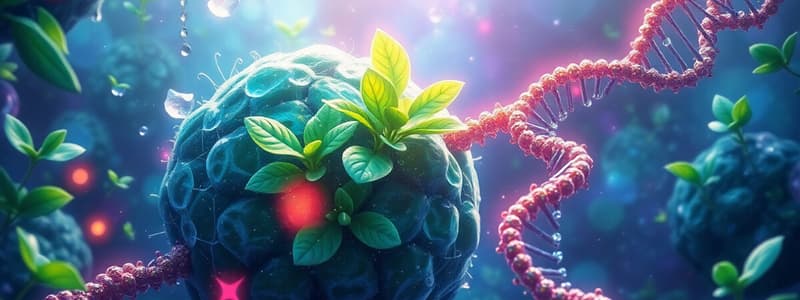Podcast
Questions and Answers
What is the basic unit of life in biology?
What is the basic unit of life in biology?
- Atom
- Cell (correct)
- Molecule
- Tissue
Which process do plants primarily use to convert sunlight into energy?
Which process do plants primarily use to convert sunlight into energy?
- Transpiration
- Fermentation
- Photosynthesis (correct)
- Respiration
What is the role of DNA in living organisms?
What is the role of DNA in living organisms?
- Energy production
- Genetic information storage (correct)
- Structure providing
- Protein synthesis
Which macromolecule is primarily responsible for providing energy to living organisms?
Which macromolecule is primarily responsible for providing energy to living organisms?
What is the process by which organisms maintain a stable internal environment called?
What is the process by which organisms maintain a stable internal environment called?
Flashcards are hidden until you start studying
Study Notes
Basic Unit of Life
- The cell is recognized as the fundamental unit of life in biology, capable of performing all life processes.
- Cells can be unicellular (single-celled organisms) or multicellular (organisms composed of multiple cells).
Photosynthesis
- Plants utilize the process of photosynthesis to convert sunlight into energy.
- During photosynthesis, plants take in carbon dioxide and water, using sunlight to produce glucose and oxygen.
- This process occurs primarily in the chloroplasts of plant cells, containing chlorophyll that captures light energy.
Role of DNA
- DNA (deoxyribonucleic acid) carries the genetic information necessary for the growth, development, and reproduction of living organisms.
- It is composed of nucleotide sequences that code for proteins essential for cellular functions.
- DNA is hereditary, meaning it is passed from parent to offspring, determining traits in organisms.
Energy-Providing Macromolecule
- Carbohydrates are the primary macromolecules responsible for providing energy to living organisms.
- Glucose, a simple sugar, is often used as a primary energy source for cells, with excess stored as glycogen in animals or starch in plants.
Homeostasis
- Homeostasis refers to the process by which organisms maintain a stable internal environment despite external changes.
- This includes regulating body temperature, pH levels, hydration, and other physiological conditions critical for survival.
Studying That Suits You
Use AI to generate personalized quizzes and flashcards to suit your learning preferences.




